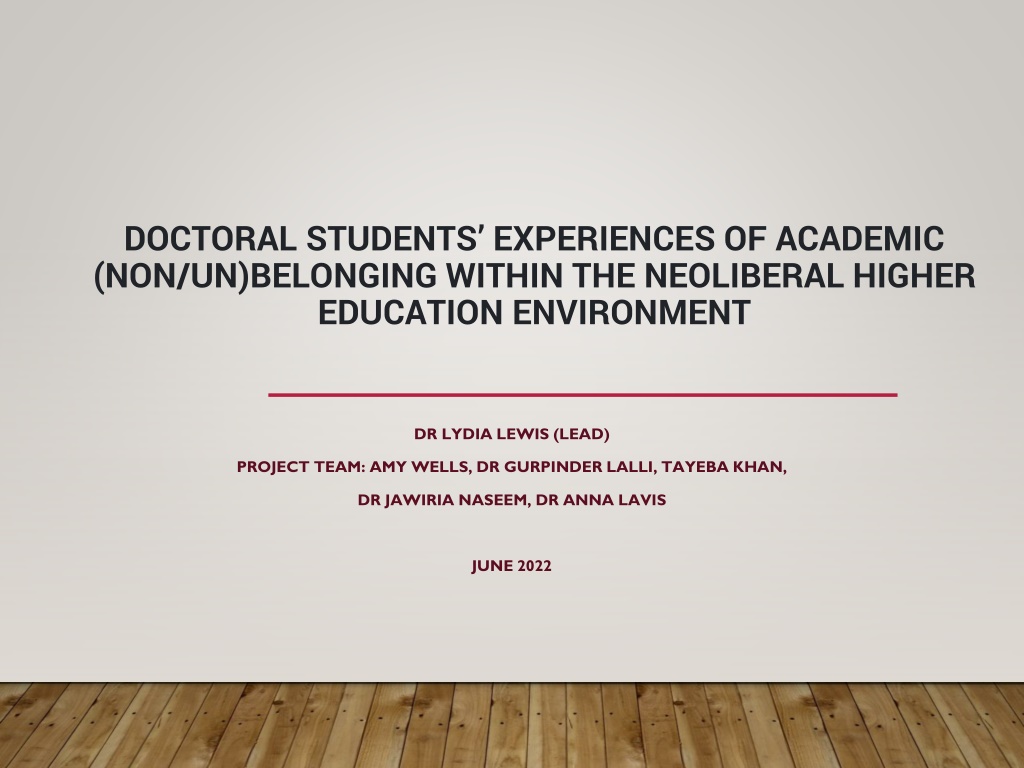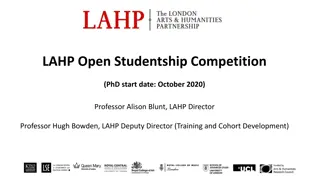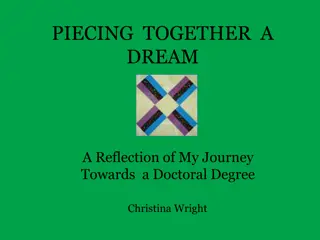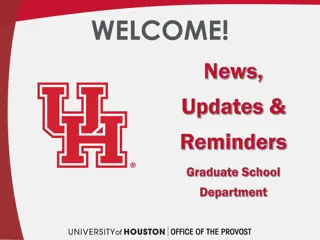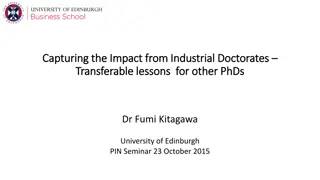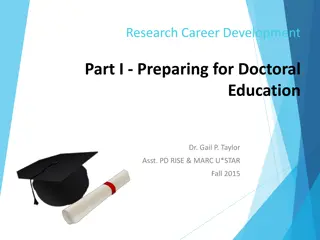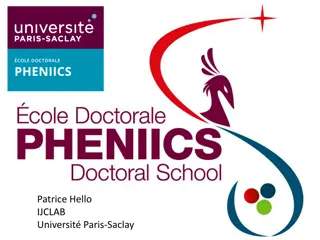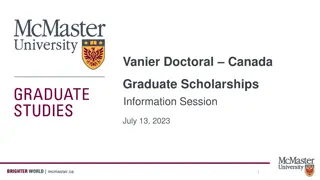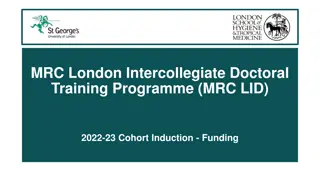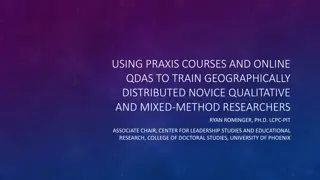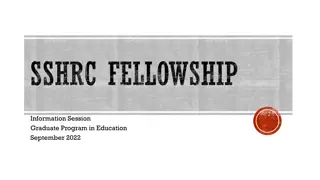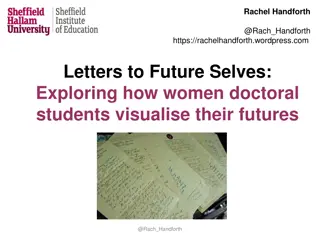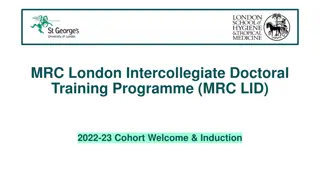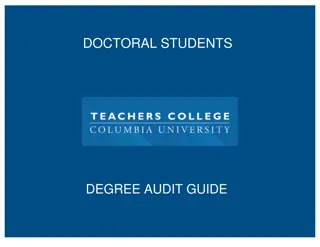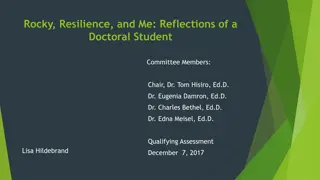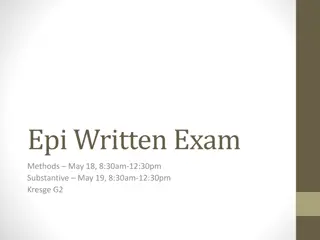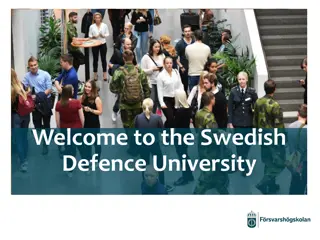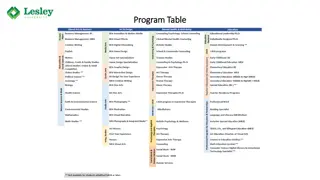DOCTORAL STUDENTS’ EXPERIENCES OF ACADEMIC
Doctoral students' experiences of academic (non)belonging within the neoliberal higher education environment through a participatory, action-oriented approach. Conceptualize belonging, delve into previous research on doctoral students' experiences, and uncover themes and findings to inform recommendations and implications.
Uploaded on Feb 27, 2025 | 0 Views
Download Presentation

Please find below an Image/Link to download the presentation.
The content on the website is provided AS IS for your information and personal use only. It may not be sold, licensed, or shared on other websites without obtaining consent from the author.If you encounter any issues during the download, it is possible that the publisher has removed the file from their server.
You are allowed to download the files provided on this website for personal or commercial use, subject to the condition that they are used lawfully. All files are the property of their respective owners.
The content on the website is provided AS IS for your information and personal use only. It may not be sold, licensed, or shared on other websites without obtaining consent from the author.
E N D
Presentation Transcript
DOCTORAL STUDENTS EXPERIENCES OF ACADEMIC (NON/UN)BELONGING WITHIN THE NEOLIBERAL HIGHER EDUCATION ENVIRONMENT DR LYDIA LEWIS (LEAD) PROJECT TEAM: AMY WELLS, DR GURPINDER LALLI, TAYEBA KHAN, DR JAWIRIA NASEEM, DR ANNA LAVIS JUNE 2022
PROJECT WEB SITE ACADEMIC (UN)BELONGING AND THE NEOLIBERAL UNIVERSITY EDUCATION OBSERVATORY
PARTICIPATORY, ACTION- ORIENTED APPROACH Stage 1 Sept 21- Feb 22 Foundational work web site set-up, engagement with key stakeholders lit review ethical considerations developing focus group schedule gathering contextual data Stage 2 Feb-May 22 8 focus groups conducted with doctoral students at the two universities (N=29) across the areas of Education and Applied Health Research. Stage 3 July 22 Discussion of initial themes and findings with doctoral students, considering proposed recommendations Stage 4 Sept-Nov 22 Discussion of findings and their implications with key stakeholders at the two universities and more widely Final reporting
CONCEPTUALISING BELONGING Belonging - affective embodied experiences of comfort, fitting in or being at home in a place, group or situation. Different aspects: feelings, identity, practice /(inter)actions, relationships, ethics and values. Social structural dimensions of belonging and identity - how intersecting categories of difference shape experience. Politics of belonging: the social creation of boundaries of exclusion and inclusion (Yuval-Davis). Non-belonging: feeling out of place, fraudulence ( imposter syndrome ) - a product of, and embedded within, social structural relations. Unbelonging: a symbolic mark of distinction of groups or individuals who are not included in a community, or who position themselves outside the community (Christensen).
PREVIOUS RESEARCH ON DOCTORAL STUDENTS EXPERIENCES Emotional intensity of doctoral study due to its transformative nature & associated identity work ((Starke-Meyerring, 2011). Social structural dimensions of belonging and identity - how intersecting categories of difference shape doctoral experience (e.g. Ahmet, 2020; Handforth 2018). Mental health - high levels of mh problems among doctoral researchers and need for strategies for reducing isolation and improving support networks. - risk factors (isolation, liminal status, susceptible to webs of power within HEIs, being female, uncertainty, peer pressure, high workload, perfectionism, competing personal and professional demands, imposter syndrome, poor supervisory communication) and protective factors (social support, viewing the PhD as a process, a positive student-supervisor relationship) (Berry, Niven and Hazell, 2021; Hazell et al., 2020; Jackman et al., 2021; Schmidt and Hansson, 2018). Factors from the departmental context and academic culture as important (e.g. relationships with other academics and peers; lab groups, office space, access to a common room). (Deem and Brehony, 2000; Delamont, 2001; Leonard et al, 2006; Schmidt and Hansson, 2018; Morris, 2019; Hazell et al, 2020; Jackman et al, 2021.)
THE NATURE OF NEOLIBERAL ACADEMIA Corporate university/ academic capitalism / takeover of HE by a logic of the market ( economisation of HE and academic work); privatisation Marketisation, managerialism, performativity Corporate values competitiveness, performance and profitability Intensification of work for academics Research environments characterised by corporate masculinity and neopatriarchy (see Hearn, 2017) Individualistand competitive research cultures Atomisation of academics and lack of academic community more generally. Fear, mistrust and lack of openness and authenticity/normal human relations. Responsibilisation of individuals for managing their own wellbeing. Shrinking of spaces for critical academic engagement.
PSYCHOSOCIAL EXPERIENCES AND FEELINGS IN CONTEXT (GILL, 2010) Need to make links between macro-organisation and institutional practices on the one hand and experiences and affective states on the other, and open up an exploration of the ways in which these may be gendered, racialised, and classed. Connect feelings with neoliberal practices of power in the Western university. Make intelligible the relationship between economic and political shifts, transformations in work and psychosocial experiences.
GILL (2010): MAKING LINKS Transformations in capitalism Psychosocial experiences of working in the university New forms of governmentality
NEOLIBERAL ACADEMIA AND DOCTORAL STUDY Doctoral students subject to neoliberal discourse e.g. measures of performativity and reductions in support (Burford, 2017, 2018). Move to mass participation system as opposed to apprenticeship model. Instrumentalism of doctoral study for the knowledge economy/ building human capital rather than personal, educational development. Marketised/transactional nature of postgraduate degrees; student as consumer. Focus on PGR student employability and increased expectations (e.g. publishing, public engagement and impact) while timeframe for completion has shrunk. Increased pressure/demands/competition and lack of time for PGR students and academics. Very competitive and intensified academic job market. Neo-liberal discourse of self-resilience and responsibility.
FOCUS GROUP PARTICIPANTS BY ETHNICITY AND HOME OR INTERNATIONAL STATUS University of Birmingham University of Wolverhampton (n=12, all female) (n=18, 15 female, 3 male) Black 1 Black British Caribbean 1 Chinese 3 British Asian 3 (2 male) 1 White British 11 (1 male) Other Asian - Taiwanese 1 Mixed White and Asian White other 2 White British 4 White other 2 International Home 6 6 International Home 1 16 Total number of participants: 29
THEMES ARISING FROM THE FOCUS GROUPS: THE CONCEPTS OF ACADEMIC BELONGING AND UNBELONGING Belonging to what? Different levels Materialised belonging & symbolic connection Relational understanding: the value of informal networks among doctoral students; the importance and mitigating effects of relationships with supervisors, but also the reductive effects on these. Academic belonging and institutional and social positionings Importance and paucity of RA and TA opportunities Research-practice divide and liminality The distinction between academic belonging and not wanting to be part of neoliberal academia. Values conflict in neoliberal academic cultures Disidentification with, or personal distancing from, academia for some mature students and students from working-class backgrounds.
(NOT FEELING) NON-BELONGING Working in universities helping combat feelings of non-belonging or imposter syndrome The difference between belonging and not feeling that you don t belong Issue of whether people want a sense of belonging from their universities (and potential for appropriation in neoliberal discourse) Accepted/expected non-belonging Research curriculum engendering non-belonging
WHAT KINDS OF RESPONSES DO THE FINDINGS INDICATE? Actions arising from the research so far. Embedded, educational approaches. Work to counteract troubling pychosocial experiences associated with neoliberal culture such as feelings of isolation, competition and stress. Tackling inequalities: work actively to include some groups at particular risk of marginalisation or isolation (where desired). Importance of space and place .
IMPLICATIONS FOR TEACHING AND LEARNING Value of critically-engaged, democratic, participatory approaches and facilitating peer learning and support networks. Active critical pedagogical engagement with reflection on the wider academic culture. Curricula and negotiating curricula More opportunities for informal discussion of research and purposeful collaboration . Induction? Empowering approaches to peer-led initiatives?
REFERENCES Ahmet, A. (2020), Who is worthy of a place on these walls? Postgraduate students, UK universities, and institutional racism. Area, 52(4), pp.678-686. https://rgs-ibg.onlinelibrary.wiley.com/doi/pdfdirect/10.1111/area.12627 Berry, C., Niven, J.E. and Hazell, C.M., 2021. Personal, social and relational predictors of UK postgraduate researcher mental health problems. BJPsych Open, 7(6). Burford, James,2018.The trouble with doctoral aspiration now.International Journal of Qualitative Studies in Education,31 (6),pp. 487-503 Burford, James,2017.Conceptualising doctoral writing as an affective-political practice.International Journal of Doctoral Studies,12,pp. 17-32 Burford, James,2017.Not writing, and giving ?zero-f**ks' about it : queer(y)ing doctoral ?failure?.Discourse: Studies in the Cultural Politics of Education,38 (4),pp. 473-484 Burford, James,2015.Queerying the affective politics of doctoral education: toward complex visions of agency and affect.Higher Education Research & Development,34 (4),pp. 776-787. Burford, J. and McChesney, K. (2021), Supporting distance doctoral students' mental health and wellbeing, Presentation to the SMaRteN Student Mental Health Network Virtual Lab for PhD researchers (online), 18th Nov. Christensen< Ann-Dorte (2009) Belonging and Unbelonging from an Intersectional Perspective, Gender, Technology and Development, 13:1, 21- 41, DOI: 10.1177/097185240901300102 Deem, R. and K. J. Brehony (2000). "Doctoral Students' Access to Research Cultures - Are some more unequal than others?" Studies in Higher Education 25 (2): 149-165.
REFERENCES (CONT.) Delamont, S. (2001), The marriage analogy: personal and positional relationships in PhD supervision. Paper presented at the Higher Education Close Up Conference 2, Lancaster University, 16 -18 July 2001. Gill, R. (2010), The hidden injuries of neoliberal academia, In R. Ryan-Flood and R. Gill (eds.), Secrecy and Silence in the Research Process: Feminist Reflections, Oxon: Routledge. Hazell, C.M., Chapman, L., Valeix, S.F., Roberts, P., Niven, J.E. and Berry, C. (2020). Understanding the mental health of doctoral researchers: a mixed methods systematic review with meta-analysis and meta-synthesis. Systematic reviews, 9(1), pp.1-30. Hearn, Jeff. (2017), Neoliberal Universities, Patriarchies, Masculinities, and Myself: Transnational personal Reflections on and from the Global North. Gender a v zkum / Gender and Research, Vol. 18, No. 1: 16 41. DOI: http://dx.doi.org/10.13060/25706578.2017.18.1.348 Jackman, Patricia C., Jacobs, Lisa, Hawkins, Rebecca & Sisson, Kelly (2021) Mental health and psychological wellbeing in the early stages of doctoral study: a systematic review, European Journal of Higher Education, DOI: 10.1080/21568235.2021.1939752 https://www.tandfonline.com/doi/full/10.1080/21568235.2021.1939752 Lee, A., Brennan, M., & Green, B. (2009). Re-imagining doctoral education: Professional doctorates and beyond. Higher Education Research & Development, 28(3), 275-287. doi:10.108
REFERENCES (CONT.) Leonard, D., Metcalfe, J., Becker, R. and Evans, J., 2006. Review of literature on the impact of working context and support on the postgraduate research student learning experience. New York, NY: The Higher Education Academy. Maisuria and Helmes (2020), Life for the academic in the neoliberal university, London: Routledge. Phipps, A. and Young, I. (2015), Neoliberalisation and Lad Cultures in Higher Education, Sociology, 49 (2): 305-322. Saunders, D. (2007), The impact of neoliberalism on college students, Journal of College and Character, 8 (5): 1-9. Savage, M. Bagnall, G. and Longhurst, B. (2004), Globalisation and Belonging, London: Sage. Schmidt, M. & Hansson, E. (2018) Doctoral students well-being: a literature review, International Journal of Qualitative Studies on Health and Well-being, 13:1, DOI: 10.1080/17482631.2018.1508171 https://www.tandfonline.com/doi/full/10.1080/17482631.2018.1508171?src=recsys Starke-Meyerring, D. (2011). The paradox of writing in doctoral education: Student experiences. In L. McAlpine & C. Amundsen (Eds.), Doctoral education: Research-based strategies for doctoral students, supervisors and administrators. Dordrecht: Springer
